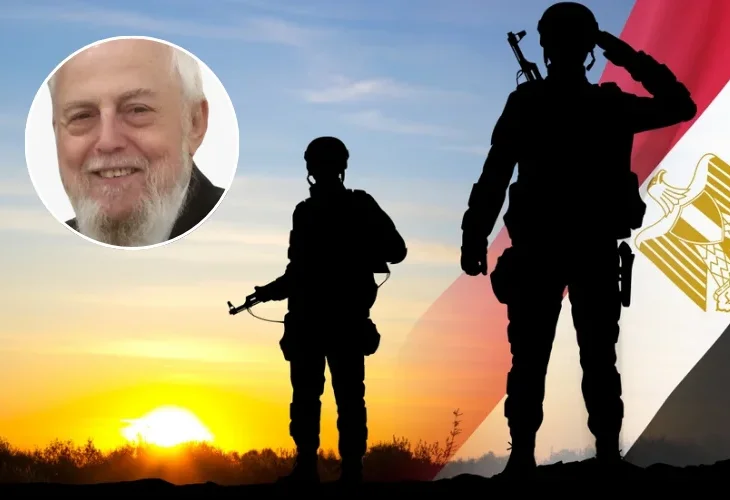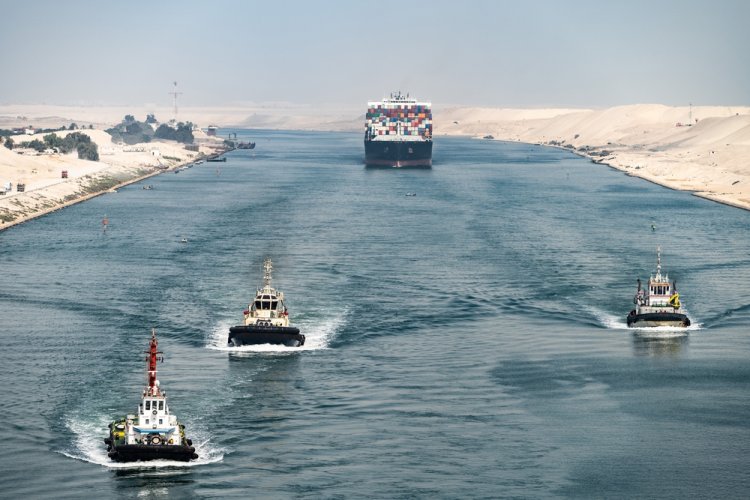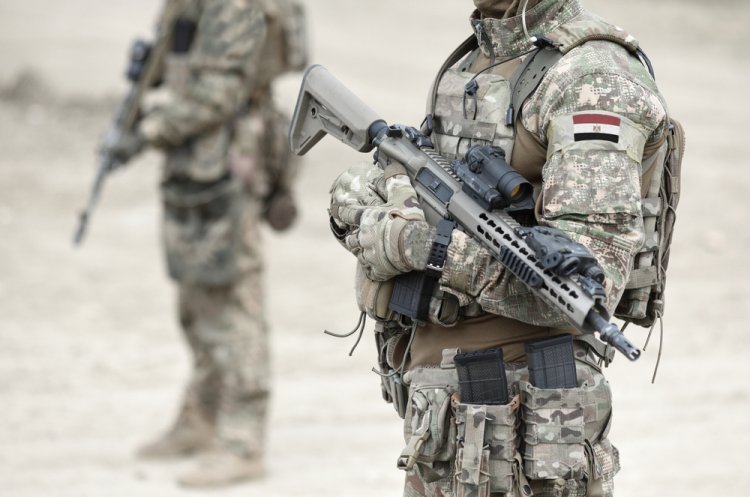Is Egypt Preparing for War? Col. Eli Dekel Sounds the Alarm
Col. (Res.) Eli Dekel has been closely monitoring the military buildup of the Egyptian army, warning that the past might be repeating itself.
 Image credit: shutterstock (Inset: Eli Dekel)
Image credit: shutterstock (Inset: Eli Dekel)Some might call him a harbinger of doom, but Col. (Res.) Eli Dekel, a former senior intelligence analyst, remains undeterred. For many years, he has been warning about the potential threat from Egypt and cautioning against a lack of military preparedness should conflict arise.
Dekel (82) devotes his life to tracking the military growth of enemy nations, with a focus on Egypt. "Such monitoring relies on satellite imagery, and since these images aren't classified, I've had the opportunity to observe every point in the world and gather intelligence," he says in an interview. "For over two decades, I've been analyzing satellite images coming from Egypt, and the only conclusion they offer is that Egypt is becoming increasingly powerful, on a scale that's hard to imagine."
Is history repeating itself with Egypt?
"Yes, and in a big way. In fact, it's been repeating for 46 years of 'peace'. The concept of 'mistaken assumptions' might suggest a one-time lapse in judgment, but here it's been ongoing since the peace agreement with Egypt. The mistaken beliefs regarding Egypt surpass those experienced during the Yom Kippur War, and more recently with Hamas. This is a longstanding failure."
Religious Conflict
The peace agreement between Israel and Egypt was achieved following the Yom Kippur War, with U.S. President Jimmy Carter mediating the talks between Prime Minister Menachem Begin and Egyptian President Anwar Sadat in 1979. "Israel believed that relinquishing Sinai would satisfy Egypt, paving a new path for peace," says Dekel. "It's a mistake to think Egypt ever intended peace, not even the so-called 'cold peace'. Since Egypt signed the agreement, it’s been preparing for the next war with Israel."
Dekel backs his claims with evidence: "By following Egypt's conduct in maintaining the agreement, one discovers an enemy that votes against us in the UN at every chance. Even in the current conflict, Egypt hasn't condemned Hamas's atrocities, not even indirectly.
"It's essential to understand that Egypt's leadership is deeply religious. President el-Sisi is known for his piety, evidenced by his wife wearing a hijab, unlike previous presidents' wives. He is frequently photographed praying at mosques, sharing these images proudly.
"Moreover, el-Sisi generously funds 'Al-Azhar', a religious-political body. Al-Azhar issued a religious ruling shortly after the war broke out, stating that Hamas's actions shouldn’t be condemned as they were reclaiming occupied territories. To them, all of Israel's land was taken from Egypt, so the ongoing war is justified until these lands are liberated. This shows Israel's folly in adopting a leftist stance that proposes land concessions for peace."
Begin wasn't thought of as a leftist.
"True, but Begin, having been the commander of the Irgun, wanted to shed his image as part of an underground group responsible for British fatalities. He wanted to be remembered as a man of peace, and the agreement with Egypt provided that opportunity. Begin acted in good faith, believing that since Sinai wasn’t integral to Israel, it was better to relinquish it than Jerusalem or other central areas.
"My theory is that this is also why Begin eventually stepped down from politics, seeing firsthand that the hoped-for peace amounted to nothing," Dekel speculates.
 Suez Canal (Credit: Shutterstock)
Suez Canal (Credit: Shutterstock)Alarming Data
During his monitoring of Egypt’s satellite images, Dekel uncovered especially alarming data. "The agreement allowed only 22,000 Egyptian soldiers by the Suez Canal, and only on its western side. Recently, Egypt's military chief stated that 44,000 troops are stationed there – double the agreed number – which is deceitful. The actual number greatly exceeds what's been declared.
"Another clause explicitly prohibits Egyptian forces from crossing the 60 km line beyond the canal, requiring them to stay within the first third of the canal's western part. This, too, has been blatantly violated. Over the years, more camps have sprung up along the canal, with Egyptian soldiers now standing just four meters from the border, equipped and armed, in direct contradiction to the agreement.
From this, you conclude that Egypt is preparing for war with Israel?
"A nation's intentions can be discerned from its military infrastructure," argues Dekel. "From the growth of ammunition and fuel depots to the construction of roads and bridges. Recently, Egypt built an underground reservoir capable of holding 180 million liters of fuel. It's a secretive facility that I uncovered. Additionally, Egypt is paving roads along the border with Israel, having built 60 bridges around the Suez Canal in recent years – an unheard-of number for any canal globally, not even on the longest one. For comparison, 70 bridges serve the entire Nile River for 100 million Egyptians. But forSuez, with less than a million people nearby, there’s no logical reason for so many bridges other than targeting Israel."
What’s their explanation?
"Egypt doesn’t explain its actions, but journalists and media bodies provide their interpretations. A frequent explanation is Egypt’s military build-up being justified by the threat of a religious war. They claim Egypt’s Sunni Islamic identity fears Shia Iran. Thus the armament is defensive. Yet this is false because if this were true, Egypt would fortify bases along the Red Sea near Iran, not around the Suez. Instead, evidence shows most munitions and fuel reserves reside in Sinai and the canal, clearly aimed at Israel."
 (Credit: Shutterstock)
(Credit: Shutterstock)And Hashem Protects Us
For years, Dekel has raised alarms about his disturbing findings, presenting his evidence and views at every venue except the military intelligence and the chief of staff. "They refuse to meet me," he laments.
Is this ignorance?
"They don't want to admit their longstanding error. To illustrate: In the fifty years since the Yom Kippur War, 500 books have been penned on the war and subsequent peace treaty, giving the agreement perpetual legitimacy. To this day, former intelligence heads and senior figures speak of an ongoing peace process, so when someone presents them with the truth, they’re unwilling to listen.
"Military intelligence observes the Egyptian army's growth under el-Sisi, their expanding munitions, but chooses to turn a blind eye, claiming el-Sisi has changed, and highlighting his preference for peace over war. However, labeling him a 'peacemaker' is incorrect. If intelligence leaders and the chief of staff would open their eyes, even for a moment, they'd see that not only hasn’t he abandoned the path of war, he’s intensifying it."
If so, what stops him from war?
“Deciding on war and its timing is highly complex. They believe that simply fighting and killing isn’t the main goal. Egypt believes that Israel was founded on land seized from them, so it dreams of reclaiming it. It merely awaits the right opportunity to act.
"In truth," Dekel clarifies, "there's no clear answer why Egypt hasn't initiated war. The IDF isn't prepared, and it hasn't even fully defeated Hamas, a non-state military force. Egypt surely crunches these numbers, realizing the IDF isn't ready for war against it, and the opportunity exists. The only explanation for their restraint is that Hashem protects and shields us."

